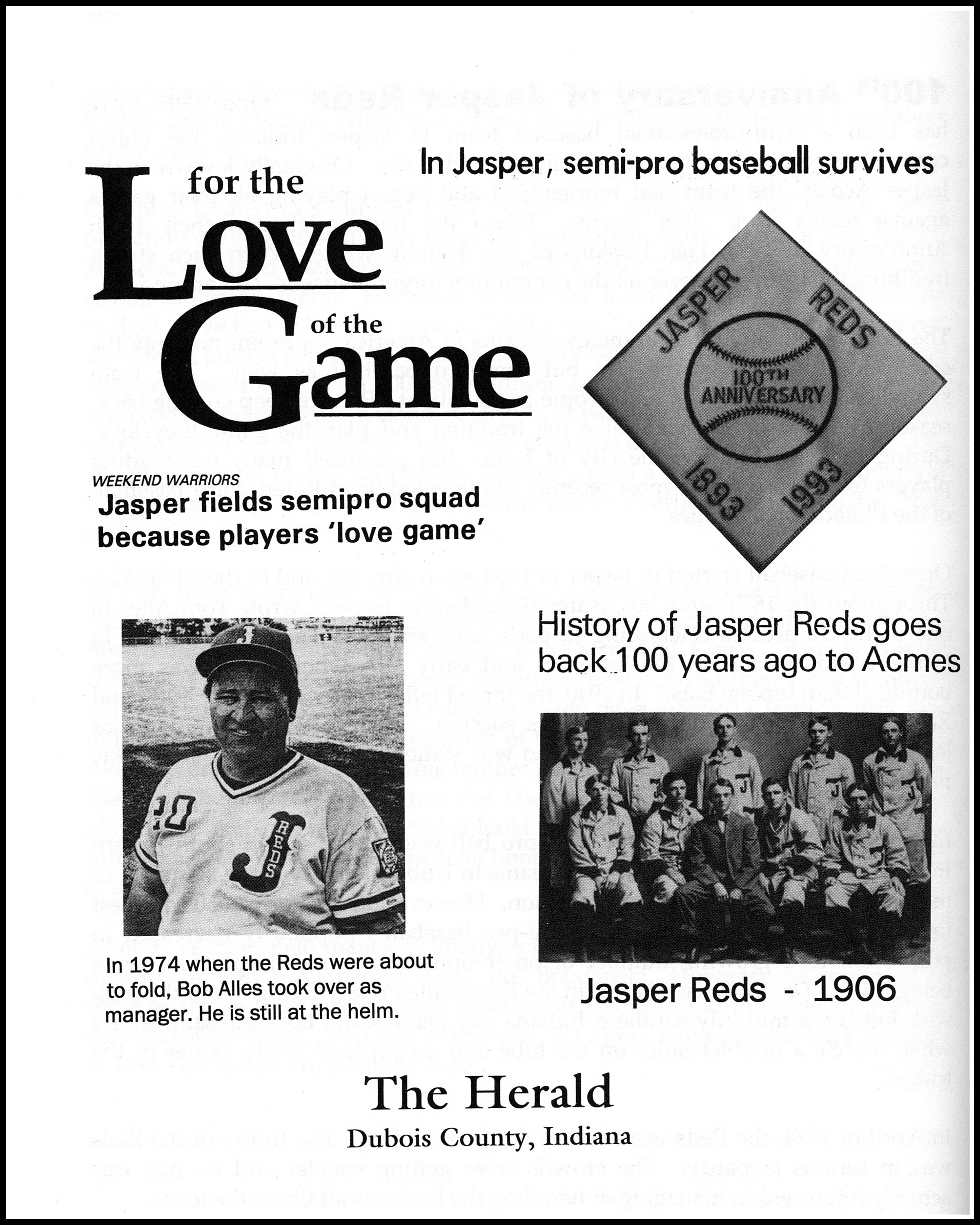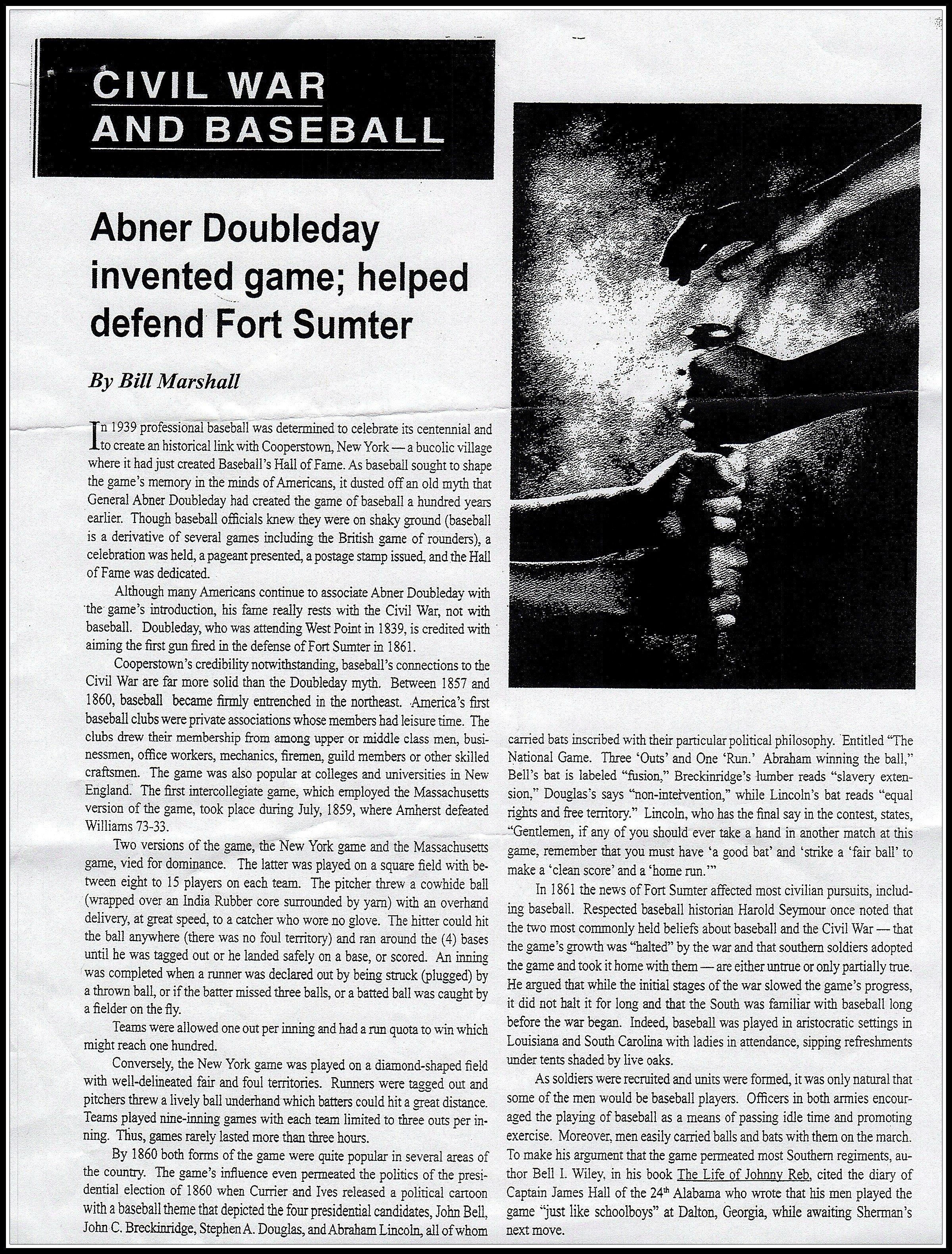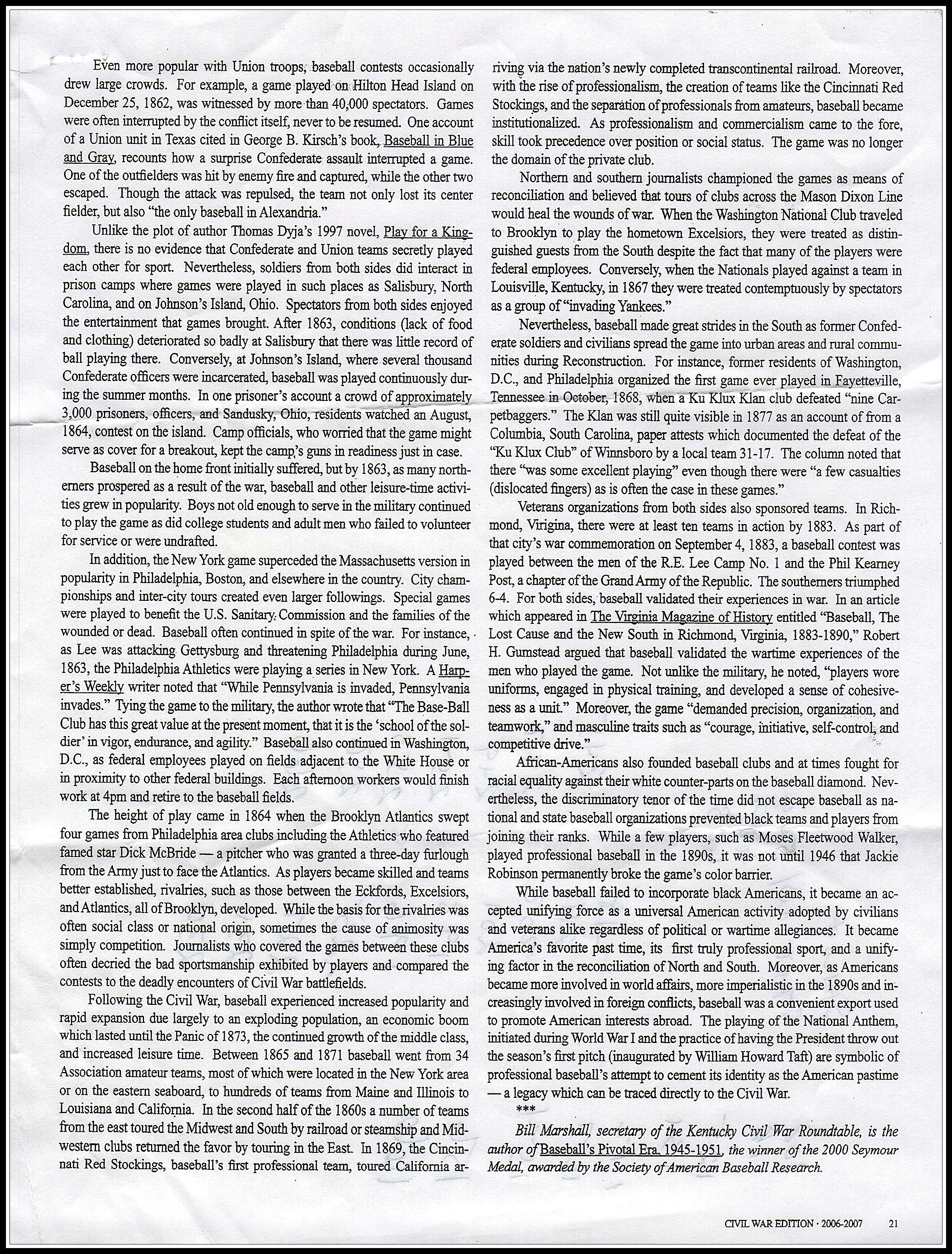The following taken from "Baseball Play America"
Copyright © 1999 Don Weiskopf and Play America Press 100th
Anniversary of Jasper Reds Since
1893, there has been a
semi-professional baseball team in Jasper, Indiana, the oldest
continuing
non-pro organization in the United States. Originally known as the
Jasper
Acmes, the team had reorganized and began playing all their games
against teams
from other towns. When the Reds celebrated their 100th Anniversary in
1993, Hak
Haskins of The Herald, wrote, "With such strong tradition, the team has
never let the community forget they were still around."
The
Reds, like many other hometown teams in America, represent
not only the spirit and tradition of the city but semi-pro baseball as
well.
The team symbolizes what the town and people are all about. Players
keep coming
back, season after season, to keep alive the tradition and play the
game they
love. During the past century, the city of Jasper has produced many
outstanding
players for the pro ranks, most recently the talented Scott Rolen,
third
baseman of the Philadelphia Phillies.
Organized
baseball started in Jasper in
1868, soon after the end of the Civil War. Throughout the 1870s and
'80s, teams
flourished in Jasper," wrote Tom Alles in one of his 10 articles
celebrating Jasper's anniversary. "The Golden Years in Jasper could
have
been the late '30s and early '40s when talent was more bountiful than
broken
bats." In 1940, the three Pfeffer brothers, Urban, 'Riff, and Roman,
had
much to do with Jasper's success. During World War II, major league
pitcher Van
Lingle Mungo, who was stationed at Fort Knox, Kentucky, pitched two
games for
the Reds.
In
the late 40s and into the 50s, semi-pro
ball was at its peak in southwestern Indiana. At one point, there were
10 teams
in Dubois County alone. Crowds of more than 1,000 spectators were
common.
However, in the early 1960s, interest in the Reds began to diminish.
Semi-pro
baseball's popularity decreased in proportion to a growing number of
other
options one-time Jasper fans were being given. David Jackson wrote in
the
Evansville Press, "Going out to the park with kids on a mid-July
southern
Indiana day just doesn't hold the same allure when there's a
doubleheader on
the tube and a couple of frosty tasties in the fridge."
In
April of 1974, the Reds were on the verge of folding. The
future of the Reds was in serious jeopardy. The crowds were getting
smaller and
no one was actually interested in managing or handling the business
affairs of
the team.

They
had no money, no manager and only a few returning players.
Jerry Birge, sports editor of the Herald, wrote an article appealing
for a
"Committee to Save the Reds." That's when Bob Alles, a 19-year-old
University of Evansville sophomore, entered the picture. A former
player for
the Reds, Alles agreed to take on the mission of saving a team in which
his
father and three brothers had played for and his father-in-law had
managed.
For
the next twenty years, Alles managed the Reds team to an
impressive 353-191 record, highlighted by the team's best season ever,
a 29-10
mark, the year Jasper celebrated its 100th
anniversary. Players wore
patches that proclaimed the extraordinary achievement. This banner
season for
the Reds was capped with an unprecedented trip to the NBC World Series.
Playing
in Wichita on artificial turf and with crowds of 2,000 a game was a
story book
finish to Jasper's century-long anniversary.
Following
the 1993 season, however, Alles
decided to relinquish his managerial duties, but not for long. Still
handling
the Reds' business affairs, Alles, a popular high school teacher,
returned as
field manager in 1996, at age 43, and now has collected over 400
victories in
24 years, everyone for his beloved Jasper Reds.
In
contrast to many less fortunate
semi-pro teams, money has not been an overly difficult task for the
Reds. With
the exception of a few lean years, area businesses have donated enough
to cover
most expenses. Team finances were given a major boost following the
1981 season
when wealthy Jasper businessman, Alvin C. Ruxer, an avid fan of the
Reds who once
pitched for the team, set up two $10,000 trust funds for the team. The
interest
from certificates of deposit has helped significantly to defray season
costs,
such as new baseballs, umpire fees, etc. Several years ago, Jasper's
Recreation
Field was renamed in memory of the late Ruxer.
To
meet their budget needs, however, Alles
and his players must each year solicit funds to keep intact a tradition
that
without strong support of Jasper citizens and businesses would have
faded away
like so many teams. And nobody seems to want to see the team die. The
team does
it by selling season passes, raffle tickets and a few donations here
and there.
As semi-pro clubs have done for so many years, the names of merchants
in this
German-flavored town have bought uniforms emblazoned with names -
"KREMPP
LUMBER", "STERNBERG FURNITURE/TV", etc. Kimball International,
for over 20 straight years, has bought the team's insurance.
The
Reds still have to depend on their
gate receipts to help carry the load. Unfortunately, it does not bring
in a
large amount of income, but helps pay for equipment, long distance
phone calls
and the cost of umpires. "During the 50s and 60s, crowds as large as a
thousand fans were at the game," said Alles, "because there wasn't
anything else to do. Now, many more big league games are being
televised,
softball has grown in popularity, and many other recreational sports
occupy the
time of people."
"But
we don't get discouraged because
we love to play," said the hefty, sunny-faced manager of the Reds.
"As long as you have that feeling, it doesn't matter if there are five
or
5,000 people in the stands. That's what has made hometown baseball.
There must
always be a local semi-pro team, not just for the fans but for the
young men
who want to play baseball."
Profile
of a Semi-pro Manager
Bob
Alles - Jasper,
Indiana Reds
Alles
exemplifies the
underlying spirit and longtime tradition of semi-pro
baseball, although not as successful as those managers who
distinguished
themselves with championships in the NBC World Series, such as Bauldie
Moschetti and Bob Sullivan. Recognition of Alles and the "100th
Anniversary of the Jasper Reds" was based on intangibles and
achievements
other than trips to Wichita. The Reds were invited only once to the NBC
classic, in 1993, the year Jasper celebrated their anniversary.
Back
in 1974, when Jasper's team was about
to fold, Alles, then a young college sophomore, took on what would have
been a
most difficult task for even the most seasoned manager. And he came
through
like a true veteran. He led his teams to numerous winning season, then
after 21
years as manager, he retired in 1993, only to be asked again to return
in 1996.
For
nearly a quarter of a century, Alles
has served with much distinction as the Reds' field manager, in
addition to
handling the club's business affairs, the often times frustrating
financial
deficits, concerns about crowd support, travel problems and fielding a
competitive team. Still in his 25 years as a manager, his teams have
won over
400 games. In all of his years of managing, he missed just three games.
The
Reds, by the way, lost all three! He buys the equipment, makes up the
schedule,
finds the players and orders their uniforms, hires the umpires, and
keeps a
close eye on the checkbook.
Alles
has had to beg for money to pay for
uniforms. He has seen his team's treasury dip below $3.00, knowing full
well
there will not be more than 50 people in the stand when his team plays
its next
game. Occasionally, he has had to coax players to come out to play or
hold off
their vacation until the season is over.
On
the field, Alles has the responsibility
to make decisions of strategy that can advance the runner, shifting the
outfield over to right, and executing the double steal. As for team
rules, he
has only two, "One that the guys can't play softball during the season,
and the other, they have to tell me if they can't come to a game. I'm not a strict
disciplinarian. My
players have had enough coaches getting on
them. Sure, we have some beer after the game, but we're very serious
while on
the field. Come in to our dugout and you'll see fire in guys' eyes."
Alles
talked about team spirit and
dedication. "We have players who will go to a place like Danville,
Illinois
in the middle of the week. They know they won't get back until 2
o'clock in the
morning and have to go to work the next day. Spirit like that means
more to me
than winning or losing a game. As
for the formation of the team roster, Alles explained one of the things
he
always has done. "If someone plays with us one year and is real
faithful
to the team, I'll write his name down the next year. Sure, there have
been
times when I could find better players, but I think, there's something
to be
said for loyalty. When our team went to Wichita, I had people tell me,
'Load
up!' But we just don't do it. According to the rules, a team is allowed
to pick
up players. I don't care
if we get beat 50 to nothing, these
guys played for me all summer, and I want them to play in the NBC World
Series.
We had a camaraderie that the other teams did not have. Players on
other teams
didn't know some of their teammates. One player told me, I don't know
him. He
just joined the team."
The
Jasper Reds has been Bob Alles' life, with
strong support from his wife, Brenda. The team has also been the life
of his
three brothers, Bill, Tom and Jerry, whose father, Jerome "Chick"
Alles, played for the Reds over a distinguished 15-year span. Indeed,
this is
the kind of dedication and commitment that has made semi-pro and
hometown
baseball so essential to a community.
|



